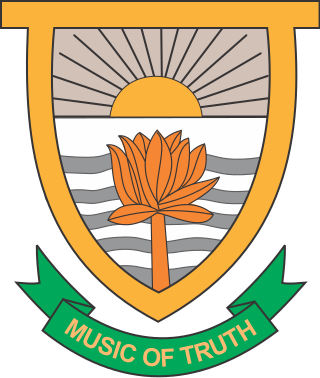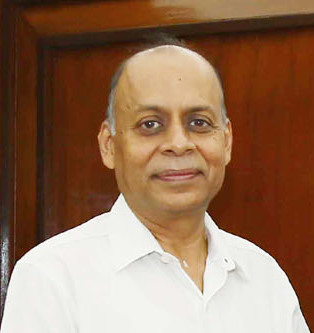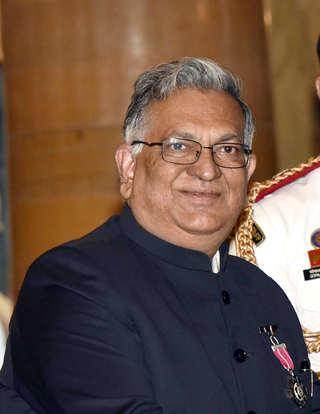Related Research Articles

Indian Institute of Technology Roorkee is a technical university located in Roorkee, Uttarakhand, India. It is the oldest engineering institution in India, and was founded as the College of Civil Engineering in British India in 1847 by the Lieutenant-Governor of the North-Western Provinces, James Thomason, in order to train officers and surveyors employed in the construction of the Ganges Canal. In 1854, after the completion of the canal and Thomason's death, it was renamed the Thomason College of Civil Engineering by Proby Cautley, the designer and projector of the canal. It was renamed University of Roorkee in 1949, and again renamed IIT Roorkee in 2001. The institution has 22 academic departments covering Engineering, Applied Sciences, Humanities & Social Sciences and Management programs with an emphasis on scientific and technological education and research. IIT Roorkee is ranked among the most prestigious academic institutions in India.

Hindu College is a constituent college of the University of Delhi in New Delhi, India. Founded in 1899, it is one of the oldest and renowned colleges. It is ranked second best among collegs in India as per National Institute Ranking Framework (NIRF). It offers undergraduate and postgraduate programmes in sciences, humanities, social sciences and commerce. It has also been awarded 'Star College' status for its Department of Biotechnology by the Ministry of Science and Technology.

The 2006 Indian anti-reservation protests were a series of protests that took place in India in 2006 in opposition to the decision of the Union Government of India, led by the Indian National Congress-headed multiparty coalition United Progressive Alliance, to implement reservations for the Other Backward Classes (OBCs) in central and private institutes of higher education. These protests were one of the two major protests against the Indian reservation system, the other one being the 1990 anti-Mandal protests.

Jagriti is a 1954 Indian Hindi-language film directed by Satyen Bose. It was based on the 1949 Bengali film Paribartan that Bose had also directed. The film stars Rajkumar Gupta, Abhi Bhattacharya, and Ratan Kumar in the lead roles. The film won the Filmfare Award for Best Film at the 3rd Filmfare Awards in 1956. Bhattacharya received the Filmfare Award for Best Supporting Actor for his outstanding performance in Jagriti at the same ceremony. Jagriti still considered one of the best children-centric films of India.

Harcourt Butler Technical University (HBTU) formerly known as Harcourt Butler Technological Institute (HBTI) is a Premier State Technical University in Kanpur, Uttar Pradesh, India. The HBTU was named after Sir Spencer Harcourt Butler, Governor of the United Provinces in British India. Its programs have been conferred in autonomous status under the university. It is one of the oldest engineering institute in the country and holds NAAC A+ accreditation and ISO 9001:2000 certification. It offers Bachelors, Masters, and Doctoral programs in engineering, natural sciences and humanities as well as Masters programs in Computer Application (MCA) and Business Administration (MBA).

Nitish Katara was a 23-year-old Indian business executive in Delhi who was murdered in the early hours of 17 February 2002 by Vikas Yadav. Yadav was the son of influential politician D. P. Yadav. Katara had recently graduated from the Institute of Management Technology in Ghaziabad where he had fallen in love with his classmate Bharti Yadav, sister of Vikas Yadav. The trial court held that Katara's murder was an honour killing because the family did not approve of their relationship. Vikas and Vishal Yadav were later found guilty by the trial Court and both were given life sentences on 30 May 2008. On 2 April 2014 the Delhi High Court upheld the trial court verdict of life imprisonment for the accused. On 6 February 2015, Delhi High Court on re-appeal on death sentence, extended sentence as 25 years' rigorous life imprisonment without remittance. On 9 September 2015, The Supreme Court of India rejected a plea by Neelam Katara seeking enhancement of sentence to death for Vishal and Vikas Yadav. On 3 October 2016, the Supreme Court sentenced Vikas and Vishal Yadav, as well as Sukhdev Pehelwan, the third accused, to 25 years' imprisonment without remission.


Dr Manmohan Singh Scholarships are available for any students for doctoral study at St John's College at the University of Cambridge and for undergraduate studies at the university. The Scholarships are named in honor of Manmohan Singh, a former Prime Minister of India and a renowned economist. Singh graduated from St John's College with a First in Economics in 1957, went on to earn a DPhil from the University of Oxford in 1962, and was awarded an honorary doctorate by the University of Cambridge in 2006.
The Indian Institutes of Technology (IITs) are Centrally Funded Technical Institutes located across India. They are under the ownership of the Ministry of Education of the Government of India and are governed by the Institutes of Technology Act, 1961. The Act declares them as Institutes of National Importance and lays down their powers, duties, and framework for governance as the country's premier institutions in the field of technology. The act currently lists twenty-three IITs. Each IIT has autonomy and is linked to others through a common council called the IIT Council, which oversees their administration. The Minister of Education of India is the ex officio chairperson of the IIT Council.
Dr. Mangu Singh was the Managing Director of Delhi Metro Rail Corporation, He took over after Dr.E. Sreedharan, the former managing director, retired from service on 31 December 2011, he retired on 31st March 2022, succeeded by Vikas Kumar. He is an Indian Railways Service of Engineers (IRSE) officer of the 1981 batch.

Indian Institute of Technology Palakkad is a public autonomous engineering and research institute located in Palakkad, Kerala. It is one of India's 23 IITs. Proposed in the 2014 Union budget of India, IIT Palakkad was established in 2015 as an Institute of National Importance by the Government of India.
Rohith Chakravarti Vemula was an Indian PhD scholar at the University of Hyderabad. From July 2015, the university stopped paying Rohith his monthly stipend of ₹25,000, with friends alleging that he was targeted for raising issues on campus under the banner of Ambedkar Students' Association (ASA), an Ambedkarite student organization.
On 29 March 2016, Delta Meghwal, a 17-year-old Dalit girl, was found dead at her college in Nokha, Bikaner district in the state of Rajasthan, India. Her body was found in a water tank of the Jain Adarsh Teacher Training Institute for Girls where she was a student. A First Information Report (FIR) lodged by her parents stated that she told them on 28 March that she had been raped by a teacher who, it is alleged, then killed her. Meghwal's cause of death has not yet been officially established.

Shanmugam Anitha was a student from Tamil Nadu, India. She scored 1176/1200 in the 12th standard exams in the Tamil Nadu State Board. This would have secured her a medical seat, if only the State Board marks had been considered for admission. In NEET-UG 2017, Anitha secured 12.33 percentage of marks while she scored 86 out of 720 marks. The minimum eligibility cut-off for making it into the merit list was 40 percentage for students in the reserved category.
Pravindra Kumar is an Indian biophysicist, bioinformatician, biochemist and professor at the Indian Institute of Technology Roorkee. He is known for his work on protein-protein interactions, protein engineering and structure-based drug design. The Department of Biotechnology of the Government of India awarded him the National Bioscience Award for Career Development in 2015, one of the highest Indian science awards, for his contributions to biosciences.

Ajay Kumar is an officer of the Indian Administrative Service, of the batch of 1985. He served as the Defence Secretary of India. He is an alumnus of IIT Kanpur and the University of Minnesota and was awarded separate two fellowships by the University of Minnesota.
Amit Singh is an Indian microbiologist and an associate professor at the department of microbiology and cell biology of the Indian Institute of Science. A Wellcome-DBT Senior Fellow, Singh is known for his studies on the pathogenesis of Mycobacterium tuberculosis. The Department of Biotechnology of the Government of India awarded him the National Bioscience Award for Career Development for 2017/18. He was awarded with the prestigious CSIR- Shanti Swarup Bhatnagar award on 2021 for his phenomenal contributions in bio-scientific research. He received the 2021 Shanti Swarup Bhatnagar Prize for Science and Technology in Biological Science.

Kota Factory is an Indian Hindi-language streaming television series created by Saurabh Khanna, directed by Raghav Subbu & produced by Arunabh Kumar for The Viral Fever. The story is set in Kota, Rajasthan, an educational hub famous for its coaching centres. The show follows the life of 16-year-old Vaibhav who moves to Kota from Itarsi. It shows the life of students in the city, and Vaibhav's efforts to get into an Indian Institute of Technology (IIT) by cracking the Joint Entrance Examination. It also stars Jitendra Kumar, Ahsaas Channa, Alam Khan, Ranjan Raj, Revathi Pillai and Urvi Singh in prominent roles.

Sudhir Kumar Jain, referred to as Sudhir K. Jain is the incumbent and 28th Vice-Chancellor of Banaras Hindu University. He is a civil engineer by education and has formerly served three terms as the founding director of the Indian Institute of Technology Gandhinagar. He has carried out intensive research and development in the fields of seismic design codes, dynamic of buildings, and post-earthquake studies. Beside these, Jain has actively participated in teaching, research activities and development in earthquake engineering focused on developing countries. He is an elected fellow of Indian National Academy of Engineering. He was also elected a member of U.S. National Academy of Engineering (2021) for leadership in earthquake engineering in developing countries.
References
- ↑ Munshi, Suhas (3 June 2010). "Help for reserved categories". Hindustan Times. Retrieved 13 May 2017.
- ↑ "Dalit suicides in India's top colleges". Christian Today . 6 May 2011. Retrieved 2 May 2022.
- ↑ Subrahmaniam, Vidya (7 May 2011). "In Dalit student suicides, the death of merit". The Hindu. ISSN 0971-751X . Retrieved 2 May 2022.
- ↑ "This tragic documentary series tells the stories of Dalit students who were driven to suicide". Scroll.in. 18 January 2016. Retrieved 17 May 2022.
- ↑ "Rohith Vemula's Suicide Triggered a New Political Wave". Sukanya Shantha. The Wire (India). 19 January 2018. Retrieved 17 May 2022.
- ↑ Boopalan, Sunder John (18 September 2017). Memory, Grief, and Agency: A Political Theological Account of Wrongs and Rites. Springer. p. 212. ISBN 978-3-319-58958-9.
- ↑ Neelakantan, Shailaja (11 December 2011). "In India, Caste Discrimination Still Plagues University Campuses". The Chronicle of Higher Education . Retrieved 2 May 2022.
- ↑ "AIIMS student kills self in hostel room". The Indian Express. Retrieved 13 May 2017.
- ↑ "'The Death of Merit': A Documentary". Round Table India. 6 May 2011. Retrieved 13 May 2017.
- ↑ Nagarkoti, Rajinder (19 August 2010). "GMCH suicide: Charges framed against two". The Times of India. Retrieved 13 May 2017.
- ↑ "Dr Jaspreet Singh: The Death of Merit – Another Documentary". Death of Merit. 5 May 2011. Retrieved 13 May 2017.
- ↑ "Documentary: The Death of Merit – Manish Kumar (IIT Roorkee)". Dr. B. R. Ambedkar's Caravan. 6 July 2011. Retrieved 13 May 2017.
- ↑ Kunwar, DS (7 February 2011). "Student of IIT Roorkee commits suicide". The Times of India. Retrieved 13 May 2017.
- ↑ Azad, Gurinder (26 July 2016). "The Death of Merit – Dr. V. Ajay Sree Chandra". Round Table India. Retrieved 6 January 2021.